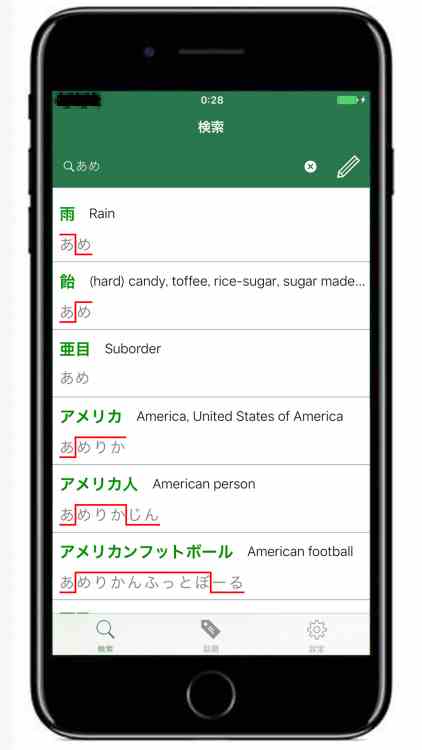Search the Community
Showing results for tags 'accent'.
-
What accent is this? New Recording 5.m4a
-
Hi everyone,I want to introduce an iOS app which is very useful for learning Japanese, especially Japanese's accent and pronunciation. The app' data is referenced from famous Japanese's websites so that it is completely reliable. Below are the app description and download link, please take a look at this.JAccent is an offline Japanese accent dictionary for Japanese teachers and learners.You can search for the Tokyo dialect accent, and you can also search for kanji's meaning.Also, you can easily find opposite words, Japanese counter suffix, Japanese surname and so on.Absolutely, you can use it daily for checking the meaning of the word.※ Features:・Over 45,500 accents・Over 5000 opposite words・Over 12,000 kanji's meaning, Onyomi, Kunyomi, writing etc.・Adjectives and verbs' forms・Japanese counter suffix, Japanese surname, Japanese place name, overseas place name・Audio listening・Kanji's handwriting recognition・Internet is not necessary (Except audio listening)※ Coming soon features:・Words and Accents' contribution・Accents' quizzes※ App's data referenced the following page: - http://accent.u-biq.org/ - http://www.gavo.t.u-tokyo.ac.jp/ojad/ - http://kanjivg.tagaini.net/ ※ Download link on AppStore: https://itunes.apple.com/jp/app/id1252200087?mt=8
-
- japanese
- dictionary
-
(and 6 more)
Tagged with:
-
Many language speakers have one accent or the other; has anyone been mocked or laughed at because of your accent and how did it make you feel? How easily did you fit in after the mockery? At work, with friends or on a holiday.
-
Syllables and Accent in Latin It seemed to me that I would overwhelm you if I added this in my previous topic with pronunciation, so I decided to give this a special attention, just a little bit about syllables and accents in Latin. Syllables Latin vowels can be both long and short. Latin diphthongs are always long. This helps determine the length of the syllables. Latin syllables can be long: - by nature/naturally if they contain a long vowel or diphthong, e.g. flos (flower) vita (life), Caesar, aurum (gold) - most good dictionaries actually tell you whether the syllable is long or short by nature - by position if they contain a short vowel which is followed by two or more consonants, e.g. arbor, dux (x is actually ks, so that counts as two). It may seem that the length of a syllable is not really important, but it actually is. It can change the meaning of the word, take for example liber - with short i, liber means book and it's a noun; with long i, it means free and is an adjective. Another example could be malum - with short a, it means evil, with long apple. Accent in Latin The first and foremost rule: Latin words are accentuated from the end, not the beginning. The accent can be on the last syllable, the penultimate syllable and the third from the back (which are, actually, in Latin the first, the second and the third). The similar system is in Ancient Greek as well - the syllables are counted from the end of the word to the beginning, and they too can be only on the last three (from our perspective, from their perspective, it's actually the first three). If a word has only two syllables, the accent is on the penultimate one (that is on the ''second'' as would be more proper to say), e.g. vita, pater, mater, terra If a word has three or more syllables, the accent is on the third from the back (or simply, ''third'', if you adopt the Latin way of counting them) if the syllable is short, e.g. Cicero (-ce- is short), populus (both po- and -pu- are short here) and on the penultimate (or the ''second'', really) if the syllable is long, e.g. natura (-tu- is long here). I know that this sounds very abstract and technical, but we have to start from somewhere, don't we? These are the very basic things and they are actually very important. You can't read Latin without them (not properly, at least). But, if it makes it any easier, I didn't like this part of the grammar either.




